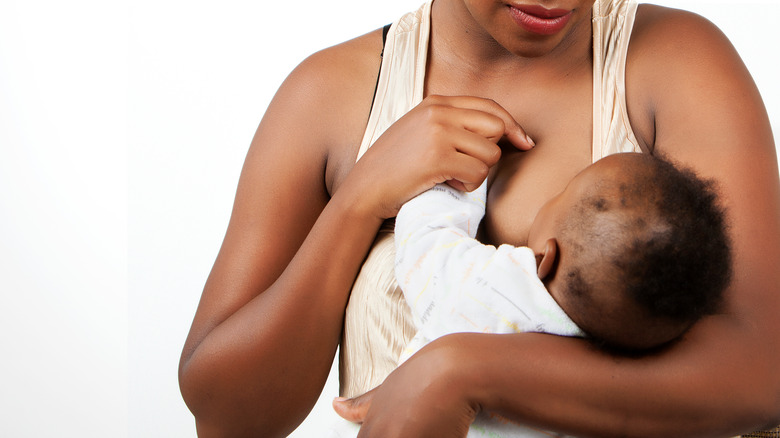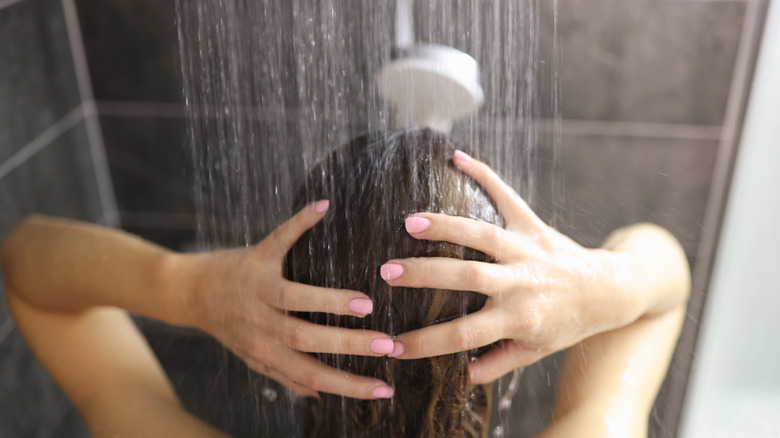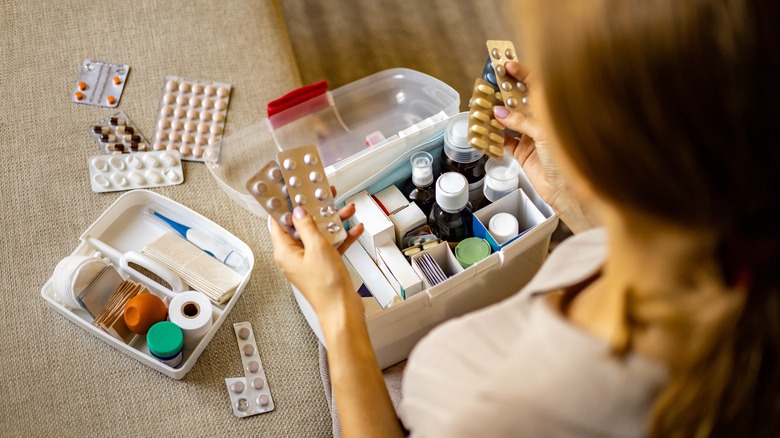What Causes Your Nipples To Bleed?
There are many reasons why nipples may bleed, ranging from causes of merely mild concern to underlying conditions that require medical attention. Bleeding nipples may sound like a nightmare situation, but it's more common than you may think. Just like other parts of your body, the skin on your breasts can bleed due to friction, irritation, or injury, according to Healthline. From breastfeeding to the clothing you wear to dry skin, nipples can bleed for a variety of reasons. Knowing the cause of nipple bleeding can help you determine the best method of treatment, whether it's simply washing the area with warm water, applying a bandage, or scheduling an appointment with your doctor.
Both the female and male anatomy contain nipples that are susceptible to bleeding, though female breasts tend to undergo more changes and trauma, per MedicalNewsToday. This is due in part to the undergarments, such as bras, that women frequently wear, as well as other experiences, like pregnancy, breastfeeding, and hormonal changes during menstrual cycles. Here's what you should know about what causes nipples to bleed and how you can take steps to treat and prevent various underlying conditions.
Breastfeeding presents opportunities for nipple bleeding
Breastfeeding is a common culprit for nipple bleeding for a number of reasons. The National Health Service (NHS) reports that breastfeeding can lead to nipples becoming sore, painful, dry, or chapped, especially if a baby isn't latching on fully or in the correct position. If breastfeeding is a painful experience or you find your nipples bleeding during or after breastfeeding, it's recommended that you speak with your doctor or midwife to determine a solution for you and your baby. Tips for alleviating pain and reducing chances of nipple bleeding that you can take if you are breastfeeding include wearing cotton bras and clothing between breastfeeding sessions to allow air to circulate around your breasts, eliminating the use of nipple shields placed in your bra, and allowing your baby to feed for as long as needed so that your milk supply isn't negatively affected.
Many times, adjusting your baby's positioning and teaching them how to latch correctly resolves nipple pain and bleeding (via MedicalNewsToday). However, there are other times when breastfeeding can lead to nipple bleeding that isn't related to your baby's positioning. If you develop an infection, like mastitis, in a milk duct, then a side effect may be nipple bleeding. Having inverted or flat nipples can also lead to nipple pain, as can intense sucking from your baby or drying of the skin that leads to cracking and bleeding around your nipples. Let your doctor know if you experience nipple bleeding while breastfeeding.
Dry skin can affect anyone
While breastfeeding can lead to dry skin around the nipples and potential bleeding, there are other reasons why dry skin may induce bleeding on and around nipples that can potentially affect anyone. Even if you aren't breastfeeding, common reasons why nipples bleed due to dry skin are contact dermatitis, friction, irritation, and excessive exposure to elements, like hot water, per Healthline. For instance, taking lengthy hot showers may cause the skin to become dry and the sensitive areas around your nipples to crack and thus bleed. If this is the case, try taking shorter showers or turning the water temperature down a tad. Avoiding scented soaps, body washes, and other products can reduce your risk of experiencing dry skin and cracked nipples. Should your nipples bleed due to inordinate dryness, you can apply an antibiotic ointment to keep the broken skin clean while it heals.
Eczema on the nipples can also lead to bleeding, particularly if you scratch the afflicted skin, according to Cleveland Clinic. This skin condition doesn't discriminate and can affect anyone, from newborns to adults, so knowing what to look for is important. Eczema is a form of dermatitis that presents with itchiness and a rash that can appear on both the nipple and areola areas. However, the rash created by eczema isn't contagious. Applying unscented lotion or moisturizer to skin with eczema can help to reduce inflammation and dryness, as can corticosteroids and other recommendations from your healthcare provider.
Bleeding from traumatic injuries to the area
Just like the skin on other parts of your body can become injured and bleed, the skin on and around your nipples is equally susceptible. Common reasons why nipples bleed from trauma or injury are rooted in piercings, tight-fitting clothing, and irritation from breastfeeding (via Healthgrades). If bleeding from an injury is accompanied by pus, then an infection might be present and you should seek medical attention. Additionally, bloody discharge from a nipple can indicate a potentially serious underlying condition and should immediately be examined by a trained healthcare professional.
When it comes to nipple piercings, it can take up to four months for the area to fully heal, reports Healthline. You'll also want to choose a salon or studio that performs piercings under sterile conditions. Be certain to follow all instructions given to you about how to keep the new piercing clean during the healing process. Should trauma-induced bleeding occur to the area around your nipple, such as from a tight-fitting bra, intense nipple stimulation, or from biting during sexual intercourse, you can use an antiseptic product, like Bactine, or other over-the-counter product to prevent potential infections from developing. Other tips include utilizing unscented laundry detergent when washing clothes, keeping the area around your nipples and breasts moisturized with scent-free products, and regularly washing the area with mild soap and warm water.




